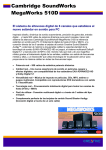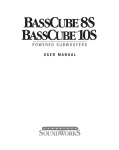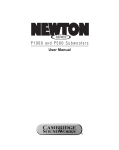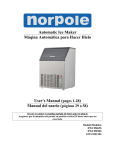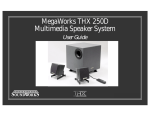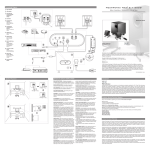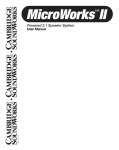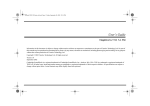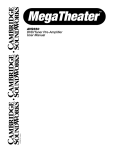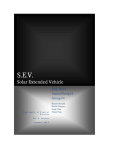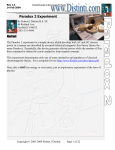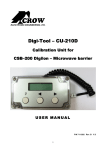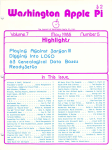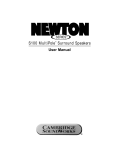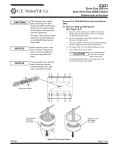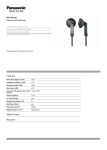Download MegaWorks 210D Manual
Transcript
POWERED SATELLITE/SUBWOOFER SYSTEM USER MANUAL The lightning flash with arrowhead, within an equilateral triangle, is intended to alert the user to the presence of uninsulated “dangerous voltage” within the product’s enclosure that may be of sufficient magnitude to constitute risk of electric shock to persons. The exclamation point within an equilateral triangle is intended to alert the user to the presence of important operating and maintenance (servicing) instructions in the literature accompanying this product WARNING AVISIQUE POUR EVITER TOUT RISQUE DE CHOC ELECTRIQUE, NE PAS DEMONTER LE COUVERCLE DU HAUT PARLEUR. AUCUN ENTRETIEN DES PIECES INTERIEURES N’EST REQUIS.TOUT SERVICE D’ENTRETIEN NE DOIT ETRE EFFECTUE QUE PAR DU PERSONNEL D’ENTRETIEN QUALIFIE. DO NOT OPEN TO PREVENT THE RISK OF ELECTRIC SHOCK, DO NOT REMOVE SPEAKER’S COVER. NO USERSERVICEABLE PARTS INSIDE. REFER SERVICING TO QUALIFIED SERVICE PERSONNEL. READ AND HEED IMPORTANT SAFETY WARNING ON SIDE OF SPEAKER ENCLOSURE CAUTION: IMPORTANT NOTICE: TO PREVENT ELECTRIC SHOCK, MATCH WIDE BLADE OF PLUG TO WIDE SLOT, INSERT FULLY. THE SERIAL NUMBER FOR THE SPEAKER IS LOCATED ON THE SPEAKER’S CONTROL PANEL. PLEASE WRITE THIS NUMBER DOWN AND KEEP IT IN A SECURE AREA. THIS IS FOR YOUR SECURITY. ATTENTION: POUR EVITER LES CHOCS ELECTRIQUES, INTRODUIRE LA LAME LA PLUS LARGE DE LA FICHE DANS LA BORNE CORRESPONDANTE DE LA PRISE ET POUSSER JUSQU’AU FOND. 2 IMPORTANT SAFETY INSTRUCTIONS READ INSTRUCTIONS – All safety and operating instructions should be read before the speaker is operated. POWER-CORD PROTECTION – The AC power cords should be routed so that they are not likely to be walked on. No object should bring weight to bear on to the AC power cords. RETAIN INSTRUCTIONS – The safety and operating instructions should be retained for future reference. LIGHTNING – For added protection for the speaker during a lightning storm, or when it is left unattended and unused for long periods of time, unplug them from the wall outlet. This will prevent damage to the speaker due to lightning and power-line surges. HEED WARNINGS – All warnings on the speaker and in the operating instructions should be adhered to. FOLLOW INSTRUCTIONS – All operating and use instructions should be followed. OVERLOADING – Do not overload wall outlets, extension cords, or integral convenience receptacles as this can result in a risk of fire or electric shock. CLEANING – Unplug the speaker from the wall outlet or other power source before cleaning. Use a damp cloth for cleaning. OBJECT AND LIQUID ENTRY – Never use probes of any kind to reach into the speaker as they may touch dangerous voltage points or short parts that could result in a fire or electric shock. Never spill liquid of any kind on the speaker. ATTACHMENTS – Do not use any adapters or attachments not recommended by Cambridge SoundWorks as they may cause hazards. WATER AND MOISTURE – Do not use the speaker near water-for example, near a bath tub, wash bowl, kitchen sink, or laundry tub; in a wet basement; or near a swimming pool or other similar areas. SERVICING – Do not attempt to service the speaker yourself as opening or removing covers may expose you to dangerous voltage or other hazards. Refer all servicing to qualified service personnel. ACCESSORIES – Do not place the speaker on an unstable cart, stand, tripod, bracket, or table. The speaker may fall, causing serious injury to a child or adult and serious damage to the product. DAMAGE REQUIRING SERVICE – Unplug the speaker from the wall outlet or other power source and refer servicing to qualified service personnel under the following conditions: VENTILATION – Slots, openings and metal fins in the cabinet are provided for ventilation, to ensure reliable operation of the speaker and to prevent it from overheating. These areas must not be blocked or covered such as by placing the product on a bed, sofa, very deep pile rug, or other similar surface. The speaker should not be placed in a built-in installation such as a bookcase or rack. a) When the power-cord or plug is damaged. b) If liquid has been spilled, or objects have fallen into the speaker. c) If the speaker has been exposed to rain or water. d) If the speaker does not operate normally by following the operating instructions; or exhibits a distinct change in performance. HEAT – The speaker should be situated away from heat sources such as radiators, heat registers, stoves, and other products (including amplifiers) that produce heat. e) If the speaker has been dropped or damaged in any way. POWER SOURCES – The speaker should be operated only from the type of power source indicated on the label. If you are not sure of the type of power supply to your home, consult your dealer or local power company. REPLACEMENT PARTS – When replacement parts are required, be sure the service technician uses replacement parts specified by Cambridge SoundWorks or have the same characteristics as the original part. Substandard substitutions may result in fire, electric shock, or other hazards. POLARIZATION – The speaker is equipped with a polarized alternating-current line plug (a plug having one blade wider than the other). This plug will fit into the power outlet only one way. This is a safety feature. If you are unable to insert the plug fully into the outlet, try reversing the plug. If the plug should still fail to fit, contact your electrician to replace your obsolete outlet. Do not defeat the safety purpose of the polarized plug. SAFETY CHECK - Upon completion of any service or repairs to the speaker, ask the service technician to perform safety checks to determine that the speaker is in proper operating condition. 3 TABLE OF CONTENTS Introduction ................................................................4 INTRODUCTION Carton Contents..........................................................5 Thanks for choosing the MegaWorks 210D Setup Options..........................................................6-7 loudspeaker. Wiring Diagram........................................................8-9 It features the finest drivers, precision internal Positioning Your Speakers ..................................10-11 crossover and amplifier circuitry and an elegant enclo- Connections ........................................................12-13 sure design. Final Adjustment ......................................................14 Cleaning ..................................................................14 The satellite speakers feature “rare earth” magnetic Specifications ..........................................................15 assemblies which are strong, yet small and light. This Fuse Replacement....................................................15 increases the interior volume of the satellite enclosure for better low frequency performance. The Product Development Team at Cambridge SoundWorks believes there is no better combination of audiophile-level attention to detail and reasonable cost. Inspecting For Damage Examine the speaker system carefully for shipping damage. If there is any, do not install or use the system. Return the speaker to the store where you made the purchase or call Cambridge SoundWorks at 1-800 FOR-HIFI (1-800-367-4434) for assistance. After Unpacking Store the shipping carton and packing material for future transport needs. QUICK SETUP If you have connected amplified subwoofer/satellite systems before, the Wiring Guide on pages 8-9 may be all you need to get set up and operating. 4 CARTON CONTENTS A) Two Satellite Loudspeakers B) Desktop Stands,Thumb screws (installed on satellites) B A C) Wallmount hardware, Self-adhesive Feet D) Hook and Loop fastener (for volume control, if not used on Desktop Stand) E) One Subwoofer/Amplifier Loudspeaker F) AC Cord G) Volume Control H) 2 Satellite Connection Cables (2-meters) Both signal cables (listed below) are C 2-meters long. No.10 screws and plastic wall anchors I) Single-Channel Signal Cable, Black RCA Phono Plug to Yellow/Orange 3.5 mm Miniplug Plugs into DIGITAL IN D Connect to a minijack digital output, like the E one found on Creative Sound Blaster Live! 5.1 sound cards. J) Stereo Signal Cable, Green Miniplug to Green Miniplug Plugs into analog LINE IN A or LINE IN B Connect to any analog sound source with a 3.5 mm stereo output jack, like Cambridge SoundWorks MusicWorks™, a portable CD player, a small headphone jack, or a computer sound card. F G H To Signal Source I J 5 Signal Cables To MegaWorks SETUP OPTIONS Cambridge SoundWorks, Inc. supplies screws and plastic anchors for convenience, but it is the speaker purchaser’s responsibility to insure that any speaker placement is secure, stable and reliable. Cambridge SoundWorks assumes no responsibility for damage to its products or any damage to property resulting from speaker positioning A or placement. SUBWOOFER/AMPLIFIER The Subwoofer/Amplifier requires no assembly. SATELLITES Desktop Placement Each satellite is shipped with a Desktop Stand installed. You can also install the Volume Control to a Desktop Stand (see page 12). Some program sources (stereo televisions, portable CD players) provide their own output level adjustment. The volume control is optional in these cases. B Shelf Placement (or other flat surface) without the Apply Feet to Bottom for Shelves Desktop Stand A) Desktop Stand Removal: unscrew the thumbscrew to release the satellite. B) Apply the soft, self-adhesive feet to the bottom surface of each satellite, as shown. C Apply Feet to Back for Wall Mounting on Screwhead Wall Mounting With Supplied Hardware Note: Use the “hook and loop” fastener to secure the volume control to a convenient flat surface if not using the Desktop Stand D C) Apply the soft, self-adhesive feet to the back of the E satellite as shown. The feet improve stability mounting and protect the finish of both the wall and the satellite. D) Install the No.10 screw and anchor in the wall so that its screwhead protrudes about 3/8 inch. E) Adjust the screw so each satellite can be hung with just a small amount of pressure. Install 6 Mount Speaker Wall Mounting With A Swivel Bracket Contact Cambridge SoundWorks about available swivel brackets. F) Follow the installation instructions for your particular mounting bracket to attach it to a flat surface. You can install the whole bracket/satellite assembly inverted. This places the bracket above the satellite, concealing it when viewed from below. In this case, remove, invert and re-install the the satellite F grille to position the logo correctly. Remove, Invert and Replace Grille Panel Floor Stands G G) Follow the instuctions included with the Newton ST300 Floor Stands to install the satellites. Using Speakers on a Stand 7 CONNECTION DIAGRAM RED DIGITAL OUT I Yellow/Orange plug – to a minijack digital output (for instance, a Sound Blaster Live! 5.1 sound card) Digital Signal Cable PO TREBLE BASS + Analog Signal Cable J 8 Green plug – to a stereo minijack analog output (MusicWorks, sound card, portable CD player) + RED OWER/STANDBY DIGITAL IN SPEAKERS + L LINE IN A R B + VOLUME CONTROL 120VAC 60Hz POWER RISK OF FIRE REPLACE FUSE AS MARKED 9 POSITIONING YOUR SPEAKERS SUBWOOFER/AMPLIFIER Place the Subwoofer cabinet on the floor, preferably near a wall. Do not place it on a desktop or shelf. For maximum bass output, place the subwoofer near a corner. If the subwoofer is placed away from the intersection of two room surfaces, the maximum bass output will be reduced. Use the Bass Level control to adjust the bass output to your desired balance. Recommended Bass control settings for each type of location are shown. Maximum Bass Output Moderate Bass Output Least Bass Output BASS BASS BASS Suggested Bass Control Compensation + + + SATELLITES Desktop Placement The Desktop Stands improve the sound for both a standing or seated listener. MusicWorks Position the satellites so they form a 45 degree angle from your listening position. 45 ˚ 10 le ang le ang 45 ˚ POSITIONING THE SATELLITES Wall Placement Avoid facing a satellite parallel to a nearby wall (within 6-8 inches). The reflected sound from the wall A degrades the sound coming directly from the satellite (diagram A). Try to position wall-mounted satellites so both are approximately at your ear level while sitting or slightly OK higher. Make sure the speakers form at least a 20degree angle with your listening position. An angle greater than 55 degrees sounds like two separate speakers, rather than forming a continuous image of sound between the two speakers (diagram B). Too Close When using the speaker for video sound, place the Too Close satellites relatively close to the television monitor, forming no more than a 45 degree angle with your listening position (diagram C). B MAXIMUM RECOMMENDED DISTANCE APART FOR HOME THEATER RECOMMENDED DISTANCE APART FOR STEREO 20 - 55 ANGLE C EAR LEVEL OR SLIGHTLY HIGHER LEVEL WITH CENTER SPEAKER 45 ANGLE POWERED SUBWOOFER Shelf Placement Place the satellites as close to the edge of the shelf as D possible for best sound (diagram D). Flush with edge if possible 11 CONNECTIONS Volume Control A) If you are using the Desktop Stand, slide the Volume Control onto the support strut on one of the stands. A B) Insert the Volume Control’s plug into the jack marked VOLUME CONTROL on the Subwoofer input panel until it snaps in place. It is not necessary to connect the Volume Control if your audio signal source provides an output level adjustment you would rather use. B Signal Connections The MegaWorks 2.1 has two analog inputs and one SPDIF digital input. C) LINE IN A (analog): Connect the 3.5 mm minijack output of any analog signal source to this 3.5 mm POWER/STANDBY DIGITAL IN SPEAKERS + TREBLE BASS L stereo minijack input, using cable J. LINE IN A LINE IN B is a second audio input that blends + + R B with LINE IN A. Connect a second audio source + VOLUME CONTROL program here. For a source with a 3.5 mm minijack output (like a headphone jack or line out jack on a portable CD player), use a 2-meter signal cable with a 3.5 mm miniplug at each end. Other sources C D may need a cable with a 3.5 mm miniplug and two Analog Inputs Digital Input RCA plugs or a 3.5 mm stereo miniplug and 3.5 mm stereo minijack. D) DIGITAL IN: Connect the output of a digital audio signal source to this RCA jack. You can use cable I to connect to most computer sound card digital outputs. When a digital signal is present, the analog audio inputs are automatically muted. Digital signal format is auto-sensed. Typical digital audio signals are 44.1 kHz 16 bit (like CD audio) or 48 kHz 16 bit (like that stored on a Digital Audio Tape-DAT). 12 Other Connection Situations d) If your television has a variable audio output, you 1) Using the MegaWorks 210D as a high performance may not need to connect the MegaWorks 210D’s stereo television sound system. volume control. The television’s remote control will a) A stereo television with audio signal output typically adjust the volume level. has two RCA-type jacks (one red, one white). To You will need to connect the MegaWorks 210D connect to these jacks, obtain a stereo signal cable volume control if either of these situations occurs: with two RCA plugs at one end and a 3.5 mm * Noise is heard even at the television’s minimum stereo miniplug at the other end (a Cambridge volume setting. In this case, connect the volume SoundWorks A12MMSRC 2-meter cable, for control and set it low enough to make the noise instance). Connect the miniplug to LINE IN A of the inaudible, then stow the volume control next to the MegaWorks 210D and the RCA plugs to your televi- subwoofer. sion’s red and white RCA jacks. (Do not connect to * You find the MegaWorks is too “sensitive.” For yellow RCA jacks. These are video outputs.) instance, if the output level is too loud when the b) Some stereo televisions offer a choice of fixed or television “volume” setting is below 30%. Connect variable audio output level. Choose the variable out- the volume control and reduce it’s setting to put. The fixed output level bypasses the television’s increase your television’s volume range. Then stow remote volume control. the volume control next to the subwoofer. c) Turn off your television’s internal speakers. This control could be located on the front or back control panels of your television, or it may be an “on-screen” menu selection. VIDEO IN 1 2 AUDIO OUT 3 (VARIABLE) VIDEO L (MONO) AUDIO R Signal Cable One 3.5 mm stereo miniplug to two RCA plugs To MegaWorks 210D LINE IN A or LINE IN B 13 2) Using the MegaWorks 210D as a sound system for a component CD player. COMPONENT CD OUTPUT Typically, there are two RCA-type jacks (one red, one white) on the CD player. To connect to these OUTPUTS jacks, obtain a stereo signal cable with two RCA plugs on one end and a 3.5 mm stereo miniplug at RIGHT LEFT the other end (a Cambridge SoundWorks A12MMSRC 2-meter cable, for instance). Connect the miniplug to LINE IN A of the MegaWorks 210D and the RCA plugs to your CD player’s red and white RCA jacks. Signal Cable One 3.5 mm stereo miniplug to two RCA plugs COMPONENT WITH RCA JACK DIGITAL OUTPUT 3) Using the MegaWorks 210D as a sound system for a home stereo component with a digital output. OUTPUTS A home component digital output will typically be an RCA-type jack. To connect to this output, obtain RIGHT LEFT a signal cable with an RCA plug at each end (a DIGITAL OUTPUTS COAX OPTICAL Cambridge Works A1DCOAX2 2 meter cable, for instance). If a cable with one RCA plug at each end can’t be obtained, a stereo version can be Signal Cable One RCA plug to one RCA plugs used. Just use one plug at each end of the same color. The MegaWorks 210D does not support optical digital signals. The digital RCA jack output of many components is labeled “coax” or “coaxial.” 14 Speaker Connections To connect the 2-meter speaker cables (two wires at each end): Push back the red speaker input tab on a satellite, exposing the wire hole. Fully insert one of the wires with a red band into the wire hole and release the tab. Repeat the procedure with the adjacent speaker wire and the black speaker input tab on that speaker. Connect the two wires at the other end of that same speaker cable to the red and black “R” speaker input tabs on the subwoofer. This satellite becomes the Right channel satellite. Repeat the preceding process to connect the other satellite (making it the Left channel satellite). AC Connection and Placement Make sure the subwoofer Power switch is in the OFF 120VAC 60Hz position (O). POWER Plug the supplied power cable first into the subwoofer back panel AC socket. Then connect it to an AC power socket. Place the satellites and subwoofer in their preferred RISK OF FIRE REPLACE FUSE AS MARKED positions, then switch the Power swith to the ON (I) position. 15 OPERATION AND FINAL ADJUSTMENT 1) Use the Volume Control or the signal source control to vary output level. 2) Defeat or cancel any “tone control” or other sound adjustments within your audio program source. Portable CD players may have “bass boost” switches and many computer sound programs have audio adjustments concealed in drop-down menus. 3) If possible, play a variety of musical CDs with good deep bass content to judge the best setting of the Bass and Treble controls. TREBLE BASS + + Cleaning The painted surfaces of the satellites and subwoofers should be wiped with a damp cloth or brushed clean. The grille panel material can be vacuumed or brushed clean. 16 SPECIFICATIONS FUSE REPLACEMENT Analog Input: IMPORTANT: Turn off and unplug the speaker before changing the fuse. 775 millivolts for full output 10 kohms input impedance Digital Input: Supports 32 kHz, 44 kHz, 48 kHz and 96 kHz data rates, any word length up to 24 bits. Amplifiers: Satellite: 60 watts continuous at 1 kHz, two channels driven at less than .1% total harmonic distortion. Subwoofer: 150 watts continuous at 100 Hz, one channel driven at less than .3% total harmonic distortion. System Frequency response: Satellite: 150 Hz to 15 kHz, +/- 3 dB Subwoofer: 32 Hz to 150 Hz +/- 3 dB Use only with a 250V fuse Employer uniquement avec un fusible de 250V 2. 3. 4. 5. Drivers: Nominal 8 inch subwoofer driver Nominal 3.5 inch satellite driver AC Voltage: 120VAC, 60Hz Dimensions (H x W x D) and Weights Satellite (without stand) 4 1/2" x 4 3/8" x 4 7/8" 113mm x 108mm x 125mm 1 pound, 1ounce 482 grams Fuse Replacement Satellite (with stand) The fuse holder is located in the power connector at the base of each speaker. The fuse is a 2.5A MDL type. 6 1/4" x 4 3/8" x 5 5/8" 160mm x 108mm x 143mm 1 pound, 3 ounces To replace the fuse: 1. Unplug the AC cord from the AC power source, then remove the AC power cord from the speaker’s power connector. 2. Remove the fuse cap with a small, flat blade screwdriver (see diagram 2). 3. Remove the fuse from the fuse cap (see diagram 3). 4. Replace the fuse inside fuse cap with another metric 5X20mm size fuse (see diagram 4). 5. Replace the fuse and cap in the power connector (see diagram 5). 6. Connect the AC power cord to the speaker. 7. Connect the power cord to an AC power outlet. 539 grams Subwoofer 11 1/8" x 10" x 10" 263mm x 255mm x 255mm 14 pounds, 8 ounces 6.6 kg 17 CAMBRIDGE SOUNDWORKS, INC. 311 Needham Street, Newton MA, 02464 Telephone: 1-800-367-4434 Fax: 1-617-527-3194 A Company P81-1750





















